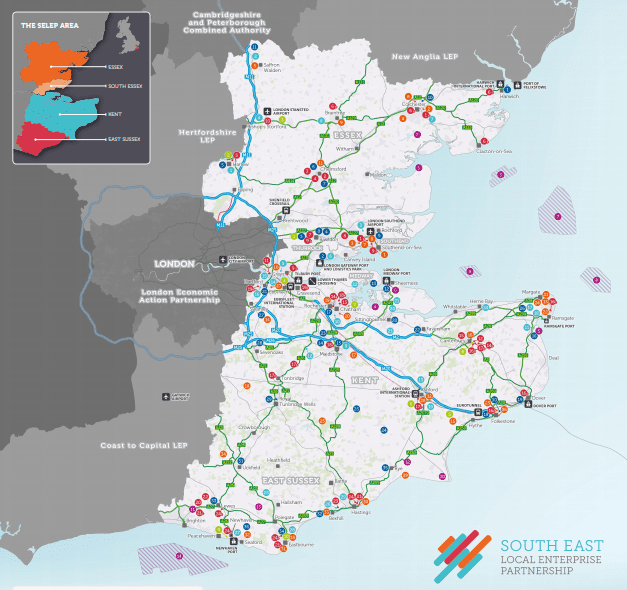
Christian Brodie, Chair of South East Local Enterprise Partnership (SELEP), reflects on how the coronavirus pandemic has changed the way we live and work and what this means for the future of communities.
The way we live and work has changed dramatically over the past 12 months. In the short term, the distinction between home and work has become blurred as we have adapted to new ways of remote working due to the coronavirus pandemic. Longer term, the flexibility that working from home offers could reshape how we see the places where we live.
The new experience of work during the pandemic is already leading planners and developers to a rethink about the purpose of our town and city centres. The new 15-minute city concept is gaining traction across the world, building a community which provides everything residents need within a quarter of an hour by foot or bike. The 15-minute city requires minimal travel among housing, work, restaurants, outdoor space, healthcare services and cultural attractions. The concept is to improve quality of life but also supports green initiatives at neighbourhood level – reducing travel and ever-growing urban sprawl. We are interested to see how this could be applied across the South East among our network of connected towns and cities.
At SELEP, we recognise that the shift in working patterns has led people to re-evaluate how they use their home, as well as the amenities in their local communities. It has also highlighted the need for the right infrastructure, both physical and digital, to be in place to enable people to work productively.
By working collaboratively with local authorities, developers, partners, and stakeholders from both the public and private sectors, we can understand where investment should be targeted to ensure we create homes and communities where people can flourish. The right housing offer and exceptional community amenities will allow us to retain and build on the talent and skills in the South East.
We have a unique opportunity to ensure that the way in which future communities are designed reflects our ambitions, to not only create attractive and aspirational places that are fit for future living, but also to create greater equality in terms of quality of life, wellbeing and economic opportunities across all our cities, towns and villages. This idea is touched upon in the concept of the circular or ‘doughnut economy’, which is being embraced in cities like Amsterdam to build more resilient communities in the wake of COVID-19. It works on the principal of ensuring everyone has access to a good quality of life, while working towards a more sustainable economy that encourages the reuse and recycling of materials.
We have invested in projects that should play their part in the success of future communities, helping to ‘build back better’ from the pandemic, including the roll-out of full-fibre broadband to hard-to-reach areas, and commercial property projects like the renovation of The Observer building in Hastings, and the creation of a modern business workhub and residential properties at The Meeting Place in Swanley. These will unlock future private investment with a share of the £85 million Getting Building Fund awarded to the LEP by government.
Accelerating housing delivery remains a key ambition for SELEP and features heavily in our forthcoming Recovery and Renewal Strategy being considered by our Board in March. We’re already building on success: in the three years to 2019/20, average net dwelling completions were 73% higher than they were five years before and that momentum has continued, with Garden Communities coming forward to meet housing demand through new sustainable developments.
Across the South East LEP area, which covers East Sussex, Essex, Kent, Medway, Southend and Thurrock, we have a number of Garden Communities both in the planning and delivery stages, including Ebbsfleet Garden City, Otterpool Park, Dunton Hills, Harlow and Gilston, Beaulieu and North Essex among others. These new communities account for about a third of the government-supported Garden Communities programme.
Beyond the delivery of housing, it is important that we recognise that the communities we live in will shape the economic potential of an area. Our communities are growing, changing at an accelerated pace, energised in part by our response to the COVID-19 pandemic. They need to be able to adapt to social, economic and environmental changes whilst retaining a sense of place and belonging.
The pandemic has accelerated some negative trends that were already happening, such as the hollowing out of the high street, and many of our towns are already pursuing opportunities through the Towns Deal, Future High Street Fund and High Streets Heritage Action Zones that will further support economic, social and cultural recovery. The pandemic has emphasised the shift to online shopping and this presents longer term challenges and opportunities for the role of high streets and town centres in the future.
These are some of the thought-provoking discussions planned for the Building Garden Communities Conference on 25 March, bringing together key stakeholders from across the South East and further afield to discuss how we can all help to deliver the homes and infrastructure needed, how to create that sense of place and how we can meet the drive to reduce carbon emissions, too. I am very much looking forward to joining the discussion.
For more details and to register to attend the Building Garden Communities Conference visit gardencommunities.co.uk.
